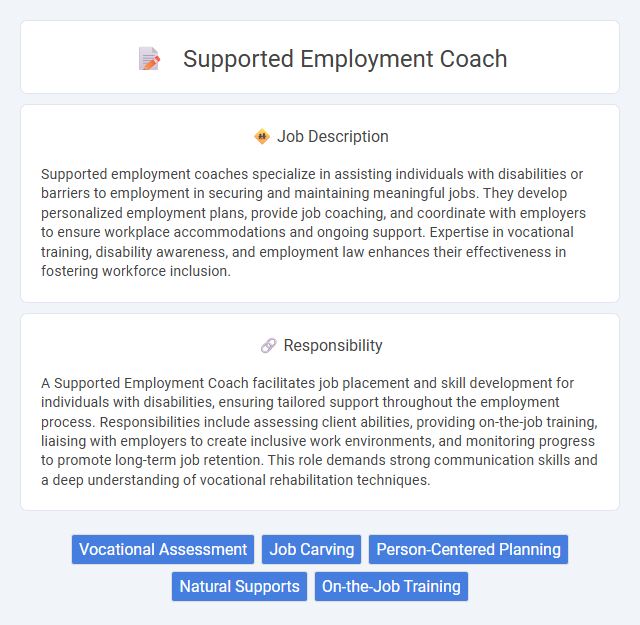
Supported employment coaches specialize in assisting individuals with disabilities or barriers to employment in securing and maintaining meaningful jobs. They develop personalized employment plans, provide job coaching, and coordinate with employers to ensure workplace accommodations and ongoing support. Expertise in vocational training, disability awareness, and employment law enhances their effectiveness in fostering workforce inclusion.
Supported employment coach roles likely suit individuals who demonstrate strong empathy, patience, and excellent communication skills, as they frequently work with people facing challenges such as disabilities or mental health issues. Candidates with a solid understanding of vocational rehabilitation and the ability to tailor support plans to diverse needs are probably more effective in this position. Those who thrive in structured yet flexible environments and possess problem-solving abilities may find long-term success as supported employment coaches.
Qualification
A Supported Employment Coach typically requires a background in social work, psychology, or a related human services field, often complemented by certifications such as CPR/First Aid or specialized supported employment training. Strong interpersonal skills, experience with vocational rehabilitation, and knowledge of disability rights laws like the Americans with Disabilities Act (ADA) enhance job effectiveness. Proficiency in developing individualized employment plans and coordinating with employers and support networks is essential for successful client outcomes.
Responsibility
A Supported Employment Coach facilitates job placement and skill development for individuals with disabilities, ensuring tailored support throughout the employment process. Responsibilities include assessing client abilities, providing on-the-job training, liaising with employers to create inclusive work environments, and monitoring progress to promote long-term job retention. This role demands strong communication skills and a deep understanding of vocational rehabilitation techniques.
Benefit
Supported employment coach roles likely offer significant benefits including personalized career guidance and skill development tailored to individuals with disabilities. These positions probably enhance employment opportunities and foster independence by connecting clients with suitable job placements. Employers may also experience improved workplace diversity and employee retention through such coaching programs.
Challenge
Supported employment coach roles likely involve navigating complex challenges such as tailoring job search strategies to diverse client needs and overcoming systemic barriers in the labor market. Coaches may face the difficulty of balancing employer expectations with individual capabilities while fostering sustainable employment opportunities. The probability of encountering emotional and motivational obstacles in clients suggests the need for resilience and adaptive problem-solving skills.
Career Advancement
Supported employment coach roles offer substantial opportunities for career advancement through skill development in personalized job coaching, workplace integration, and disability advocacy. Progression pathways often include senior coaching positions, program management, or specialized consultancy roles that leverage expertise in employment support strategies. Continuous professional development and certifications in vocational rehabilitation or mental health can further enhance upward mobility within this growing field.
Key Terms
Vocational Assessment
A Supported Employment Coach specializes in conducting comprehensive vocational assessments to identify clients' strengths, skills, and career interests, ensuring tailored job placement strategies. These assessments evaluate physical, cognitive, and social abilities alongside work history to determine suitable employment opportunities. Accurate vocational assessments improve job match quality, enhancing long-term employment success for individuals with disabilities or barriers to employment.
Job Carving
Supported employment coaches specializing in job carving analyze individual strengths and employer needs to customize job roles for people with disabilities. They collaborate with employers to restructure tasks, enhancing productivity and workplace inclusion. This approach maximizes employee engagement and supports sustainable employment outcomes.
Person-Centered Planning
Supported employment coaches specialize in Person-Centered Planning to tailor job placements that align with each individual's strengths, preferences, and career goals. They collaborate closely with clients, employers, and support networks to develop customized employment strategies that promote long-term success and independence. This approach enhances job satisfaction and retention by prioritizing the unique needs and aspirations of every person served.
Natural Supports
A Supported Employment Coach specializes in fostering Natural Supports within the workplace to enhance job retention and employee independence for individuals with disabilities. They identify and strengthen informal relationships between employees, supervisors, and coworkers, leveraging existing workplace dynamics to provide continuous guidance and encouragement. This approach reduces reliance on formal interventions by promoting collaborative problem-solving and community integration.
On-the-Job Training
Supported employment coaches provide tailored on-the-job training to individuals with disabilities, enhancing their skills and confidence in real work environments. They collaborate closely with employers to create adaptive strategies, ensuring effective integration and productivity. This hands-on coaching accelerates job retention and fosters long-term career growth for trainees.
 kuljobs.com
kuljobs.com